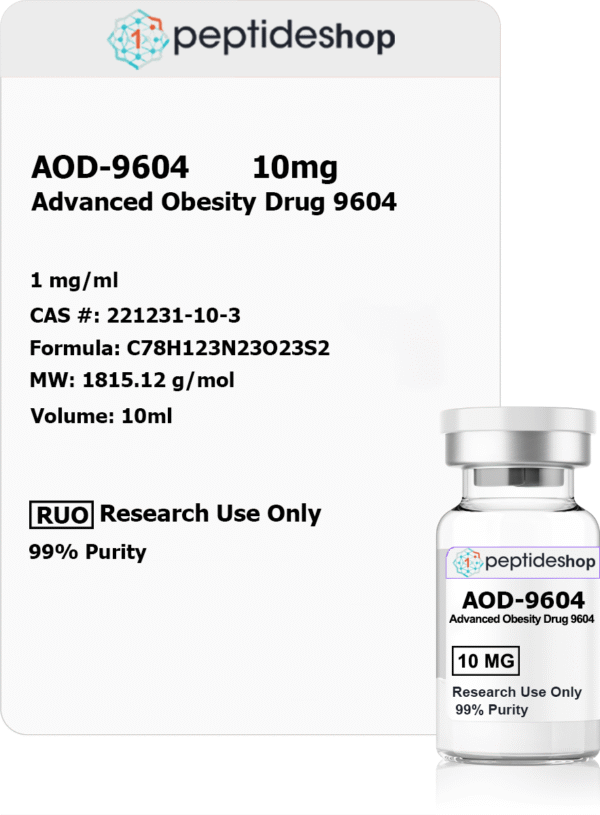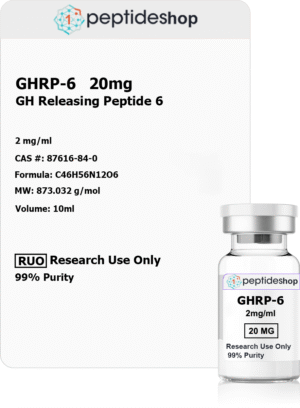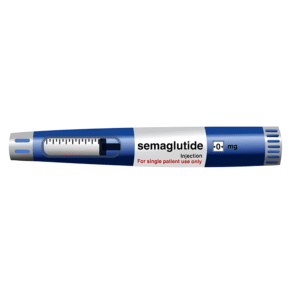AOD-9604 (10mg)
Original price was: $95.00.$52.00Current price is: $52.00.
AOD9604 is a modified version of the hGH fragment 176-191 peptide (contains a di-sulfide bridge) and thus a derivative of human growth hormone (hGH). Originally developed as a lipolytic (fat burning) compound, AOD9604 has shown benefit in studies of heart disease, osteoarthritis/cartilage repair, and metabolic syndrome. AOD9604 stimulates lipolysis (the breakdown or destruction of fat) and inhibits lipogenesis in animal studies.
Contents of the Package
- 1 x 10ml sterile multi-dose vial
- Active ingredient: AOD-9604 at 1mg/ml
- Clear, sterile injectable solution
- Diluted in bacteriostatic saline
- Packaged in USP-grade tamper-evident vial
- For subcutaneous injection only
About Melanotan 2 (MT2)
AOD-9604 is a synthetic peptide fragment derived from the C-terminal region (amino acids 176–191) of human growth hormone (hGH). Unlike full-length GH, AOD-9604 is non-hormonal, with no effect on IGF-1 or systemic growth hormone levels.
It was originally developed to target fat metabolism by promoting lipolysis and preventing lipogenesis. AOD-9604 supports body fat reduction, especially visceral fat, and may improve metabolic efficiency, making it ideal for weight management programs.
Because it does not influence glucose, insulin, or IGF-1 levels, AOD-9604 is considered safer than traditional GH therapy and can be used long-term with minimal risk.
Mechanism of Action
AOD-9604 exerts its effect by mimicking the fat-burning region of hGH, without affecting the rest of the hormone’s activity. It acts through beta-3 adrenergic receptors, promoting fat breakdown and blocking fat storage.
Mechanisms include:
- Stimulating lipolysis (breakdown of stored fat)
- Inhibiting lipogenesis (formation of new fat cells)
- Activating fat-burning enzymes in adipose tissue
- Enhancing mitochondrial oxidation of fatty acids
Unlike hGH, it does not impact muscle growth, blood glucose, or bone density, making it highly specific for fat metabolism.
Adverse Reactions
AOD-9604 has demonstrated an excellent safety profile, comparable to placebo in multiple clinical trials.
Possible side effects include:
- Mild injection site irritation (redness, itching)
- Headache or fatigue (rare)
- Bloating or fullness if injected too close to meals
- No hormonal side effects reported
It does not stimulate IGF-1 production or affect glucose metabolism.
Benefits
Potential Benefits:
- Targeted reduction in visceral fat
- Supports weight loss and fat metabolism
- No impact on blood sugar or IGF-1
- Non-hormonal, safe for long-term use
- May improve energy output and metabolic flexibility
Side Effects
⚠️ Possible Side Effects:
- Mild redness or itching at injection site
- Occasional headache or fatigue
- Very low incidence of systemic side effects
- No reported hormonal disruption
Contraindications & Precautions
- Do not use in individuals with peptide allergies
- Use cautiously in patients with active malignancies, even though AOD-9604 is non-mitogenic
- Not recommended during acute illness or infection
- Avoid injection near scar tissue or inflamed skin
Drug Interactions
AOD-9604 is considered pharmacologically safe and has no known drug interactions. It is commonly paired with:
- L-Carnitine or fat burners for synergistic fat loss
- GH secretagogues (e.g., Ipamorelin) for complementary support
- Anti-inflammatory or regenerative peptides (e.g., BPC-157, TB-500)
There are no interactions with blood pressure, cholesterol, or diabetic medications.
Pregnancy & Breastfeeding
Due to the lack of human data, AOD-9604 should not be used during pregnancy or breastfeeding. Although non-hormonal, its impact on fetal development or milk production is not well studied.
Children
AOD-9604 is not FDA-approved for pediatric use. While some studies have investigated its role in pediatric obesity, it should only be used under medical supervision and within clinical trials for children.
FDA approval
AOD-9604 is not FDA-approved for therapeutic use in the United States. However, it has GRAS (Generally Recognized As Safe) status in select countries for oral supplement use. Injectable formulations are classified as investigational compounds and are available through compounding pharmacies for clinician-directed protocols.
References
- Heffernan M, et al. (2009). “Safety and tolerability of AOD-9604: a randomized, placebo-controlled study.” Clinical Obesity.
- Ng FM, et al. (2000). “AOD-9604: a GH fragment that selectively stimulates lipolysis.” Journal of Endocrinology.
- Lau DC, et al. (2010). “Metabolic outcomes from AOD-9604 administration in obese individuals.” Obesity Research & Clinical Practice.
- Horvath A, et al. (2011). “Pediatric obesity trial of AOD-9604: safety and effects.” Hormone Research in Pediatrics.
- U.S. FDA, ClinicalTrials.gov, and PubMed





